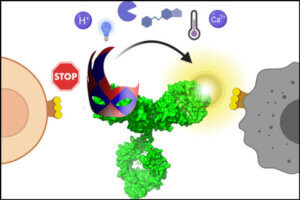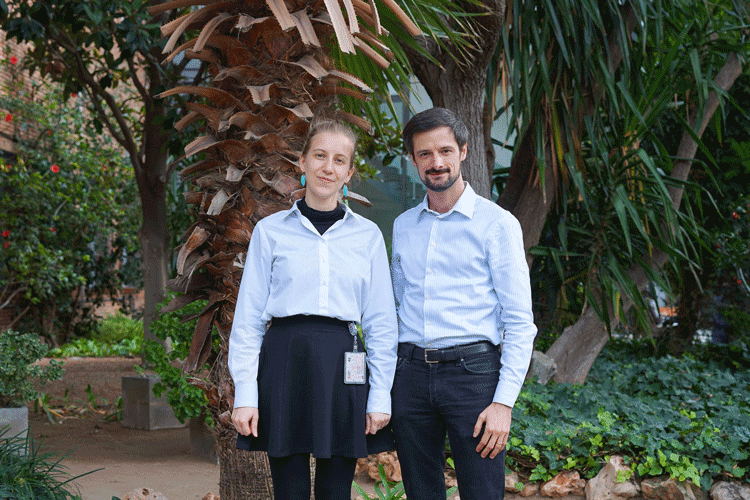Dr Roberta Lucchi recently defended her doctoral thesis at IQS, in which she developed new strategies to generate conditionally active proteins with biotherapeutic applications in therapies such as cancer treatments.
The use of proteins as therapy, including antibodies and cytokines, has been steadily increasing over the past three decades. Despite the success of biotherapies in treating different diseases, they are often associated with dose-limiting side effects. For this reason, there is a growing trend towards controlling biotherapeutic activity with internal or external stimuli. Selective therapy activation at the site of interest makes it possible to improve both the safety and efficacy of the treatment, up to incorporating antigens that would otherwise be considered non-pharmacological.
The ChemSynBio research group with the Department of Bioengineering at the IQS School of Engineering is working on the development of new biotherapies aimed at cancer cells, combining biological and synthetic chemistry. Dr Roberta Lucchi conducted her doctoral thesis within this group, entitled Development of new strategies to generate conditionally-active proteins for precision therapies. It was directed by Dr Benjamí Oller Salvia, coordinating professor of the ChemSynBio group, and supervised by Dr Salvador Borrós.

The main objective of Dr Lucchi’s thesis was the development of new strategies to generate conditionally active proteins with biotherapeutic applications for cancer treatments. To do so, the research was carried out in two parts: the first, focused on the development of a single-chain variable antibody fragment (scFv) whose function can be activated by different stimuli, while the second explored the application of de novo protein design tools to design fragments that mask various therapeutic proteins.
For the first objective, Dr Lucchi developed a procedure that would allow the production and characterization of the target scFv to subsequently proceed with its reversible inactivation with different masks. After selecting eight conjugation sites, a position was identified that maximized masking efficiency, without affecting the affinity of the unmasked scFv for its target. The masking ability of polymers of different sizes and natures was evaluated with this mutant, finally implementing the ability to respond to two different stimuli. This masking strategy combining chemistry and biotechnology has the potential to be applied to any antibody format, with any antigen specificity, and with any activation stimulus.
In the second part of her thesis, Dr Lucchi studied the application of de novo protein design tools, including generative artificial intelligence tools, to create protease-sensitive biotherapies using a hyper-stable mini-protein against EGFR and mimetics of two cytokines, IL-2 and IL-21. By applying various in silico methods, different masks were designed that specifically interact with the protein of interest and prevent it from binding to the receptor. This research made it possible to confirm that the masks used make it possible to reduce the binding of the antigen to various degrees, and it was also possible to observe the binding capacity after the proteolytic cleavage of the mask.
This part of Dr Lucchi’s thesis was carried out in collaboration with Dr David Baker’s group at the Institute for Protein Design/ Howard Hughes Medical Institute with the University of Washington.
In short, Dr Lucchi’s thesis opens the doors to the design of new strategies to achieve stimulus-sensitive proteins that can be used to create potentially safer and more efficient therapies.
Related publications
M. C. Lucana, R Lucchi, F Gosselet, C. Díaz-Perlas, B. Oller-Salvia. BrainBike peptidomimetic enables efficient transport of antibody derivatives across brain endothelium. RSC Chemical Biology. 2024, 5, 7-11
Roberta Lucchi, Maria C. Lucana, Montserrat Escobar-Rosales, Cristina Díaz-Perlas, Benjamí Oller-Salvia, Site-specific antibody masking enables conditional activation with different stimuli, New Biotechnology, 78, 2023, 76-83
Roberta Lucchi, Jordi Bentanachs, Benjamí Oller-Salvia, The Masking Game: Design of Activatable Antibodies and Mimetics for Selective Therapeutics and Cell Control, ACS Cent. Sci. 2021, 7, 5, 724–738.
Roberta Lucchi, Sandra Prat, Maria Celia Lucana, Cristina Diaz Perlas, Benjami Oller-Salvia, Activatable Antibody Mimetics for the Selective Delivery of Therapeutics, 36th European Peptide Symposium, January 2022
This thesis has received funding from the Ministry of Universities for University Professor Training – FPU Grant
The projects that have led to these results have received funding from the “la Caixa” Foundation (ID 100010434), the European Union’s Horizon 2020 research and innovation programme – Marie Sklodowska-Curie (MSCA) grant No. 847648 and No. 844441, the Ministry of Science and Innovation – AEI/10.13039/501100011033 (PID2020-117486RA-I00), and the Spanish Association Against Cancer AECC IDEAS211057OLLE).










